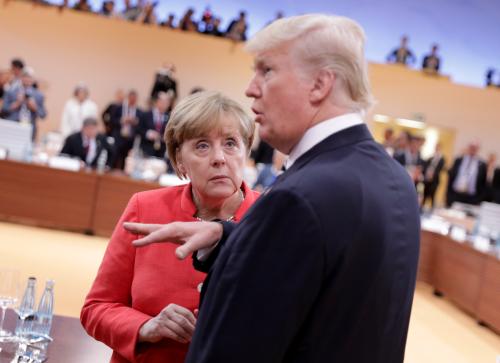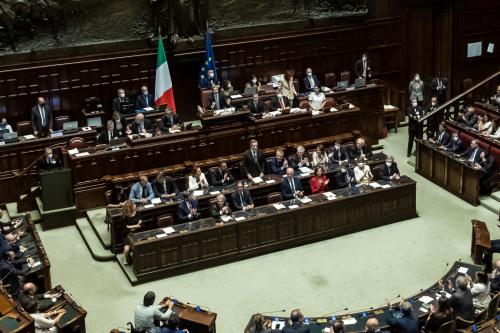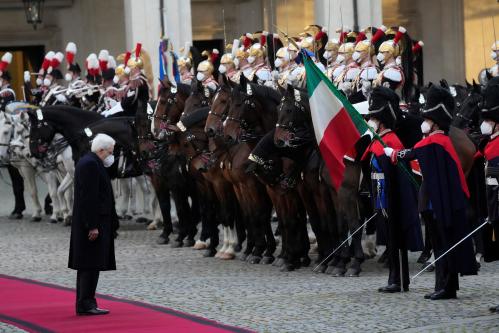Italian foreign policy has been making front-page news recently—but not in a good way. A flirtation with China on infrastructure deals within the framework of the Belt and Road Initiative and a diplomatic spat with France after Italy’s deputy prime minister met with a senior figure from the anti-government Yellow Vests are just a few examples of Rome’s current disorientation on foreign policy matters. As the European Parliament elections approach in May, the confused and scattershot foreign policy of Italy—Europe’s fourth-largest economy and a major political actor on the continent—will negatively impact Italy-Brussels relations and weaken the EU external projection.
The tensions between the two parties in power in Italy—the populist Five Star Movement and the far-right League—over both domestic and international issues, result in a lack of a broader and shared vision on foreign policy strategies. In this context, Prime Minister Giuseppe Conte is trying to balance different political backgrounds of strong party leaders along with more technical figures like himself and Minister of Foreign Affairs Enzo Moavero Milanesi. As a result, foreign policy appears fragmented between institutional and competing individual initiatives.
At an institutional level, for example, Italy’s prime minister and its president defend Italy’s role in Europe and guarantee continuity in the country’s traditional alliances. Conte goes to Brussels to reassure partners of Italy’s reliability while defending his government’s agenda; likewise, President Sergio Mattarella calls for the Italian government to align with other EU member states in recognizing Juan Guaidó as acting president of Venezuela. At an individual level, Deputy Prime Minister and Interior Minister Matteo Salvini fuels the League’s sovereigntist narrative, for example by adopting tough anti-immigration measures, building up a sovereigntist front for the upcoming EU elections, and working to strengthen ties with Vladimir Putin’s Russia. Meanwhile the Five Star Movement’s leader Di Maio—who is also minister of economic development, labour, and social policies—adopts a populist narrative when he criticizes France’s colonial past, argues with the EU on budget restraints, and approaches China for investments. In all these quarrels, Minister of Foreign Affairs Moavero Milanesi is completely overshadowed. International partners are confused and Italian diplomats struggle to put out the frequent fires.
The confrontational approach of the Salvini-Di Maio camp has already impacted relations between Rome and Brussels, especially since this new government has repeatedly shown a loss of faith in the European Union and in European allies. After years of the Italian government trying—and often failing—to gain more helpful engagement from the EU and its member states on migration issues, the current Italian government closed harbors to NGO ships in the hope of forcing a reaction by the EU.
On economics, Rome complained about Brussels’ inflexibility on eurozone budget constraints and engaged in tough negotiations with the EU Commission on the Italian budget law. Under the new definition of “sovereignty” that emerges from Five Star budget quarrels with the EU and the League’s “Italians First” narrative, bilateral contacts are largely preferred over broad international obligations that might get—so the narrative goes—in the way of Italy’s most direct national interests.
Italy has so far refused to join the July 2018 European Intervention Initiative, led by France, that aims to move the EU in the direction of strategic autonomy from the United States. Instead, Rome seeks cooperation with Washington for the stabilization of Libya at a time when the U.S. administration is questioning both the trans-Atlantic partnership and U.S. operations in the Middle East and North Africa. As a result, when Italy convened a summit for Libya in Palermo last November, there was little high-level participation from the United States or EU member states.
Recent polls show that the League will most likely be the second-largest delegation (the German Christian Democratic Union being the first) with 27 seats in the European Parliament. While the League will almost surely be the largest Italian party in the next Euro-chamber, Five Star will gain around around 22 seats that will mean that both these parties will have a significant representation compared to the previous composition of the Parliament (respectively 6 and 12). Overall, this will translate in more confrontation and a fueling of divisions on EU foreign policy projection.
In particular, Rome is looking at the engagement of Moscow and Beijing as potential bargaining chips with the United States and the European Union vis-à-vis the stabilization of Libya, immigration burden-sharing, and budget flexibility. In order to make sure that Moscow would continue to support the U.N. plan for the stabilization of Libya, Italy is likely to insist on the removal of the sanctions towards Russia and weaken the Eastern Partnership initiatives. Italy’s recent openness to China to finance the infrastructure investments that the country so fundamentally needs—but cannot pursue on a large scale due to EU budget constraints—would likely result in a weakening of the EU strategic outlook towards Beijing. As an example, Italy’s abstention from the vote on the screening mechanism on foreign investment is a sign that this government looks at China as merely a business partner and underestimates political risks.
Italy is missing out on influencing European decisionmaking at a pivotal moment for the continent’s future security.
The strategy that the Italian government has adopted so far has a few short-term gains: It is raising Italy’s voice in the world and it positions the country as a swing power eager to be courted. Unfortunately, this approach will not pay off in the long run. By excluding itself from the EU defense initiative, Italy is missing out on influencing European decisionmaking at a pivotal moment for the continent’s future security. By flirting with China, Italy risks losing control of its strategic assets. While Italy has been able to maintain friendly relations and strong business ties with Russia within the framework of the alliance with the United States and European integration for decades, a seriously closer alignment with Moscow has very little to offer. So far, Italy has not fully aligned with Poland or Hungary on more radically critical positions towards the EU, and this is a good thing. At the same time, Italy’s confrontational narrative and actions create tensions with like-minded countries like France or Spain and will result in a loss of opportunities for a reform of the EU and eurozone towards a more politicized and integrated model.
If the government wants to stick to a sovereigntist approach, it should at least have a clearer view on what national interests are in the present and in the foreseeable future; weakening the EU foreign policy and engaging with third countries on bilateral level is not as profitable as it seems.







Commentary
The broken compass of Italian foreign policy
March 29, 2019